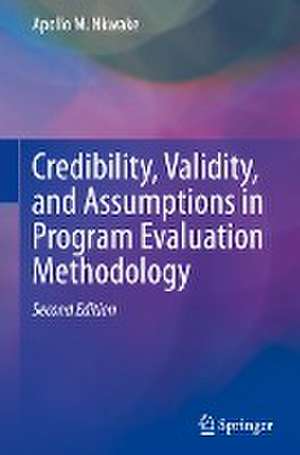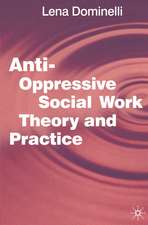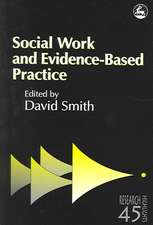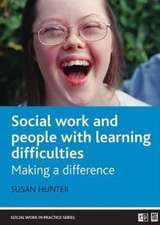Credibility, Validity, and Assumptions in Program Evaluation Methodology
Autor Apollo M. Nkwakeen Limba Engleză Hardback – 14 dec 2023
The second edition extends the review of methodological assumptions to the evaluation of humanitarian assistance. While evaluatorsof humanitarian action apply conventional research methods and standards, they have to adapt these methods to the challenges and constraints of crisis contexts. For example, the urgency and chaos of humanitarian emergencies makes it hard to obtain program documentation; objectives may be unclear, and early plans may quickly become outdated as the context changes or is clarified. The lack of up-to-date baseline data is not uncommon. Neither is staff turnover. Differences in perspective may intensify and undermine trust. The deviation from ideal circumstances challenges evaluation and calls for methodological innovation. And how do evaluators work with assumptions in non-ideal settings? What tools are most relevant and effective? This revised edition reviews major evaluations of humanitarian action and discusses strategies for working with evaluation assumptions in crises and stable program settings.
| Toate formatele și edițiile | Preț | Express |
|---|---|---|
| Paperback (1) | 381.98 lei 6-8 săpt. | |
| Springer International Publishing – 22 oct 2016 | 381.98 lei 6-8 săpt. | |
| Hardback (2) | 389.31 lei 6-8 săpt. | |
| Springer International Publishing – 19 aug 2015 | 389.31 lei 6-8 săpt. | |
| Springer Nature Switzerland – 14 dec 2023 | 728.60 lei 6-8 săpt. |
Preț: 728.60 lei
Preț vechi: 888.53 lei
-18% Nou
Puncte Express: 1093
Preț estimativ în valută:
139.43€ • 144.74$ • 116.27£
139.43€ • 144.74$ • 116.27£
Carte tipărită la comandă
Livrare economică 24 martie-07 aprilie
Preluare comenzi: 021 569.72.76
Specificații
ISBN-13: 9783031456138
ISBN-10: 3031456130
Ilustrații: XXI, 186 p. 12 illus., 9 illus. in color.
Dimensiuni: 155 x 235 mm
Greutate: 0.47 kg
Ediția:2nd ed. 2023
Editura: Springer Nature Switzerland
Colecția Springer
Locul publicării:Cham, Switzerland
ISBN-10: 3031456130
Ilustrații: XXI, 186 p. 12 illus., 9 illus. in color.
Dimensiuni: 155 x 235 mm
Greutate: 0.47 kg
Ediția:2nd ed. 2023
Editura: Springer Nature Switzerland
Colecția Springer
Locul publicării:Cham, Switzerland
Cuprins
Chapter 1. Constituents of Evaluation Practice.- Chapter 2. Credible Methodology.- Chapter 3. Validity in Framing an Evaluation’s Purpose and Questions.- Chapter 4. Validity in Evaluation Designs and Methods.- Chapter 5. Validity in Measures and data collection.- Chapter 6. Validity in Analysis, Interpretation, and Conclusions.- Chapter 7. Validity in Evaluation Utilization.- Chapter 8. Validity in performance measurement.- Chapter 9. Explication of Methodological Assumptions: A Metaevaluation.- Chapter 10. Working with assumptions in humanitarian assistance evaluation.- Chapter 11. Conclusion.
Notă biografică
Apollo M. Nkwake is a Global Lead-Senior Technical Advisor for Monitoring, Evaluation and Learning (MEL) at Action Against Hunger USA. He previously worked as Associate Research Professor for MEL at The George Washington and Tulane Universities. He was a Senior Research Associate at Education Development Center. He also served as Senior MEL Manager at World Agroforestry Center. Apollo holds a PhD in Social Development from University of Cape Town and holds Canadian Evaluation Society’s Credentialed Evaluator designation. Dr. Nkwake is a recipient of American Evaluation Association’s 2017 Marcia Guttentag Promising New Evaluator Award. He has authored six books, several journal papers/book chapters and guest edited several special journal volumes. He is also the author of: Working with Assumptions in International Development Program Evaluation. He is Associate Editor for American Journal of Evaluation, a member of the International Evaluation Academy Council and Evaluation Reviewer forUNDP’s Independent Evaluation Group.
Textul de pe ultima copertă
This book focuses on methods of choice in program evaluation. Credible methods choice lies in the assumptions we make about the appropriateness and validity of selected methods and the validity of those assumptions. As evaluators make methodological decisions in various stages of the evaluation process, a number of validity questions arise. Yet unexamined assumptions are a risk to useful evaluation. The first edition of this book discussed the formulation of credible methodological arguments and methods of examining validity assumptions. However, previous publications suggest advantages and disadvantages of using various methods and when to use them. Instead, this book analyzes assumptions underlying actual methodological choices in evaluation studies and how these influence evaluation quality. This analysis is the basis of suggested tools.
The second edition extends the review of methodological assumptions to the evaluation of humanitarian assistance. While evaluators ofhumanitarian action apply conventional research methods and standards, they have to adapt these methods to the challenges and constraints of crisis contexts. For example, the urgency and chaos of humanitarian emergencies makes it hard to obtain program documentation; objectives may be unclear, and early plans may quickly become outdated as the context changes or is clarified. The lack of up-to-date baseline data is not uncommon. Neither is staff turnover. Differences in perspective may intensify and undermine trust. The deviation from ideal circumstances challenges evaluation and calls for methodological innovation. And how do evaluators work with assumptions in non-ideal settings? What tools are most relevant and effective? This revised edition reviews major evaluations of humanitarian action and discusses strategies for working with evaluation assumptions in crises and stable program settings.
The second edition extends the review of methodological assumptions to the evaluation of humanitarian assistance. While evaluators ofhumanitarian action apply conventional research methods and standards, they have to adapt these methods to the challenges and constraints of crisis contexts. For example, the urgency and chaos of humanitarian emergencies makes it hard to obtain program documentation; objectives may be unclear, and early plans may quickly become outdated as the context changes or is clarified. The lack of up-to-date baseline data is not uncommon. Neither is staff turnover. Differences in perspective may intensify and undermine trust. The deviation from ideal circumstances challenges evaluation and calls for methodological innovation. And how do evaluators work with assumptions in non-ideal settings? What tools are most relevant and effective? This revised edition reviews major evaluations of humanitarian action and discusses strategies for working with evaluation assumptions in crises and stable program settings.
Caracteristici
Provides practical tools to guide systematic choice and documentation Analyzes assumptions underlying methodological choices in evaluation studies Analysis offered is supported by a collation of assumptions collected from over 35 evaluations




















